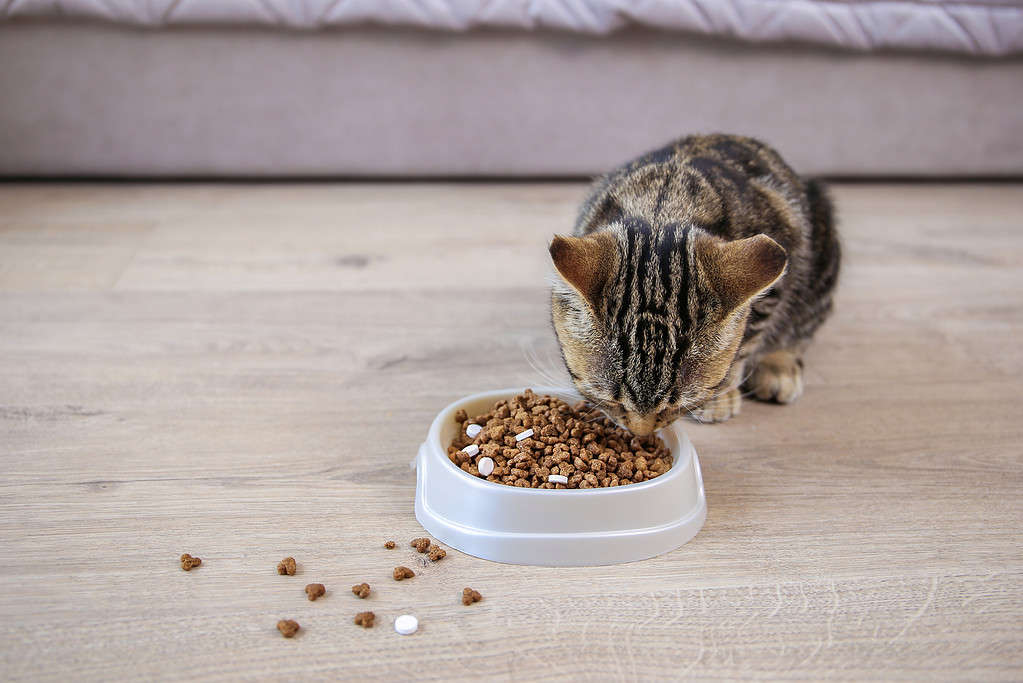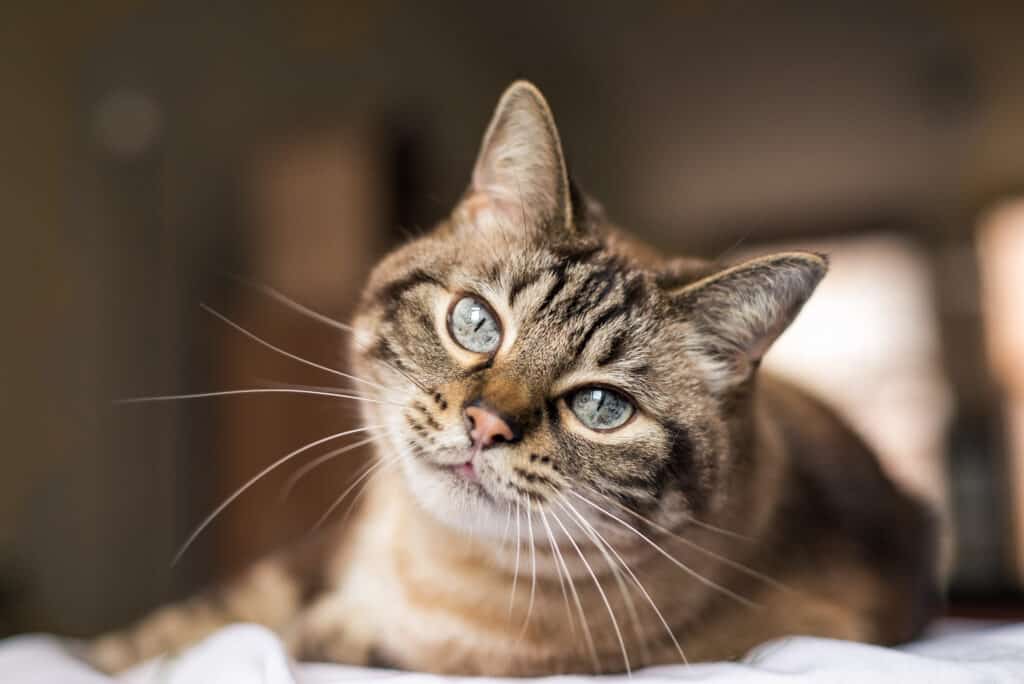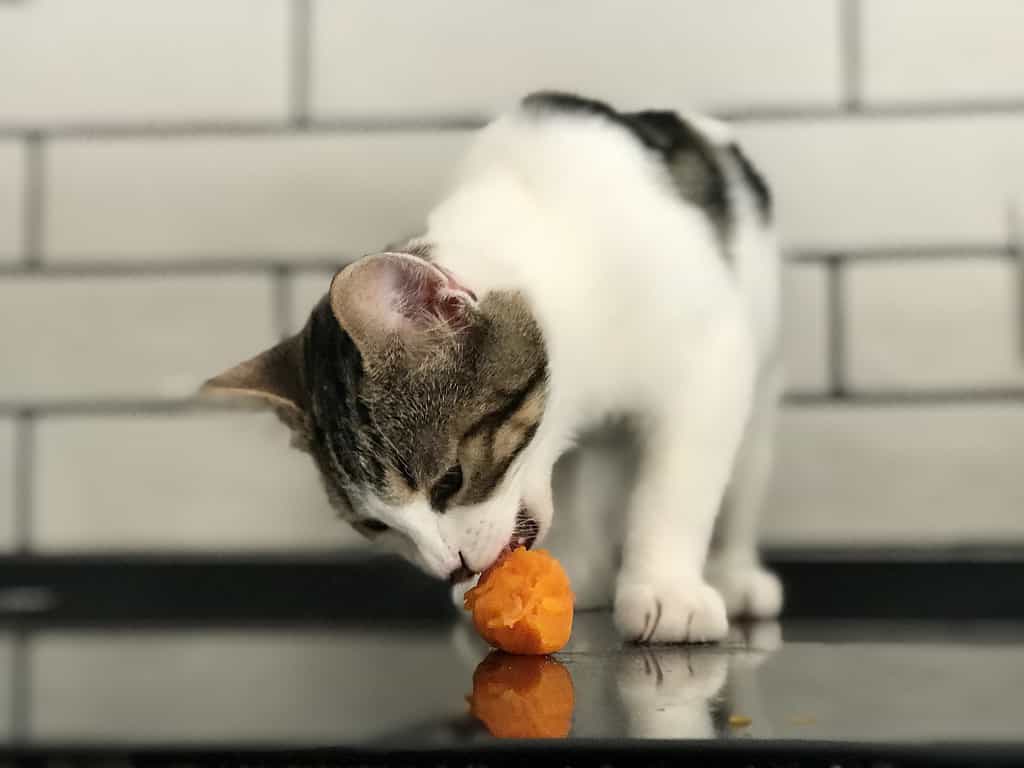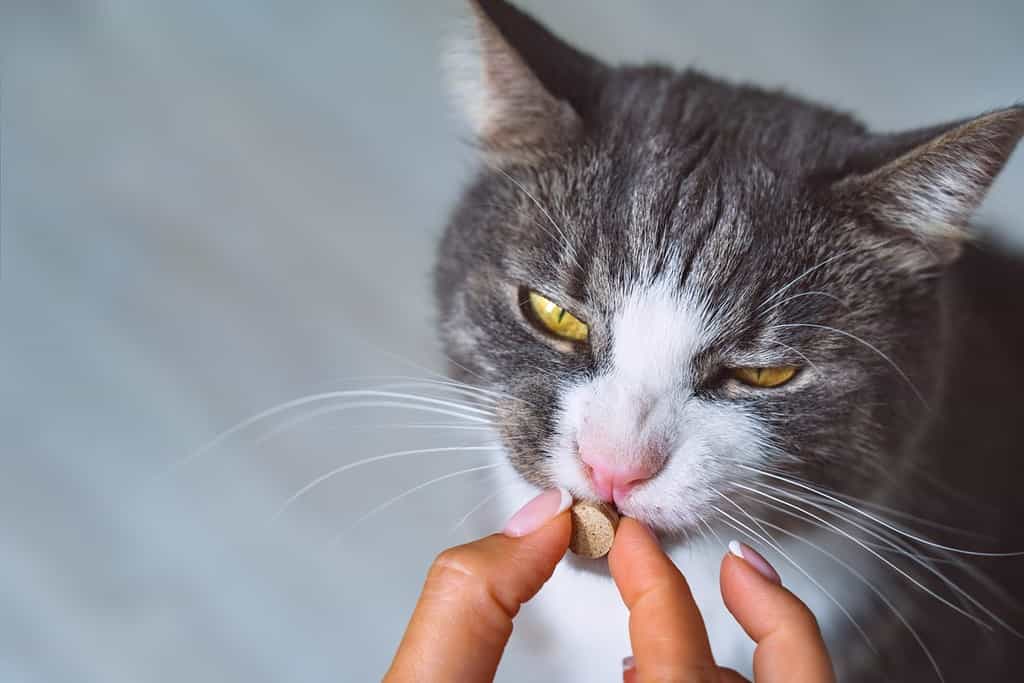Your cat needs essential nutrients to keep their bodies healthy. This includes proteins, fats, vitamins, and minerals. One essential component of your cat’s diet is taurine. You may have seen it mentioned on cat food packaging. Here we explain why there is taurine in cat food and what happens to your cat if they do not get enough of it. You mustn’t make changes to your cat’s diet or give them supplements without taking your vet’s advice first.
What Is Taurine?
Protein is an essential part of an animal’s diet and proteins can be broken down into smaller molecules called amino acids. One of these amino acids is called taurine. Its molecular chemical structure is C2H7NO3S. An animal’s body obtains taurine either by making it from other amino acids (such as methionine) or by eating it.
Why Do Cats Need Taurine?

Cats need taurine for healthy eyesight, heart function, immunity, growth and development.
©Nils Jacobi/Shutterstock.com
Omnivores (animals that eat animals and plants), including humans, can make sufficient taurine to keep them healthy. Cats, on the other hand, can make only small amounts of taurine. Their bodies are not very good at doing it. This means that if they do not ingest taurine in their diet, their bodies will not have enough of it to stay healthy. As a result, taurine has been designated as an essential nutrient in a cat’s diet.
In cats, taurine is essential for normal vision, digestive function, heart muscle function, and a healthy immune system. It is also required for the development of kittens in the womb and to maintain a healthy pregnancy in cats. Kittens need taurine to grow and develop.
How Do Cats Get Taurine?

Taurine is added to commercial cat food.
©Mukhina1/iStock via Getty Images
Taurine is found in uncooked meat (muscle and some organs) and this is how most wild cats get sufficient taurine to keep them healthy. Most domestic cats, however, eat commercially available cat food and this is usually processed by heat. The heat degrades or destroys the taurine and therefore commercial cat foods need to contain additional taurine supplements. You can also buy cat taurine supplements yourself.
The AAFCO recommended minimum concentration of taurine for adult cat maintenance is 0.50 g per 1000 kcal ME. Experts recommend that cats need about 50 mg of taurine a day. You should consult your vet to find out how best to meet your cat’s taurine needs. Younger, older, and pregnant cats may need more taurine.
Signs of Taurine Deficiency in Cats
The signs and symptoms of taurine deficiency in cats can be subtle. Your cat may have been suffering from the deficiency for some time before you notice anything. However, the symptoms don’t go away and will gradually get worse. It is called a degenerative condition. The signs of taurine deficiency in cats include:
- Blindness – caused by degeneration of the retina (cells at the rear of the eye).
- Weakened heart muscles – caused by dilated cardiomyopathy.
- Digestive problems – particularly an inability to break down fats due to a lack of bile salts. This can cause diarrhea.
- Pregnancy issues including fetal abnormalities and low birth weights in kittens.
- Poor growth and development in kittens (kittens have trouble gaining weight).
- Poor muscle tone and general weakness.
- Poor immune function resulting in repeated and prolonged infections.
- Electrolyte disorders resulting in heart problems, bone problems, and dental issues.
- Potential increased risk of diabetes.
How Does Taurine Deficiency Cause Blindness in Cats?

A taurine deficiency can cause blindness in cats.
©iStock.com/Photography by Adri
The first condition to be connected with taurine deficiency in cats was central retinal degeneration (CRD). It affects the special cells at the rear of the eye that collect light and turn it into nerve impulses. These are sent to the brain which interprets what the cat is seeing. Without taurine, the cells break down and the cat’s vision begins to fail. This condition is not reversible. However, if it is caught early enough what is left of the cat’s vision can be saved. The treatment is taurine supplementation.
How Does Taurine Deficiency Cause Heart Disease in Cats?
A taurine deficiency was not linked to heart failure in cats until the 1980s. Now, we know that it causes a type of heart disease called dilated cardiomyopathy (DCM). Healthy heart muscle contracts and relaxes to pump blood around the body. If the heart muscle cells are not healthy, they cannot contract properly and the heart cannot do its job. The cat’s heart gets larger but the muscle walls get thinner. Signs of heart failure in cats are:
- Reduction in exercise and movement.
- Fainting.
- Lethargy.
- Weakness.
- Poor appetite.
- High breathing rate.
- Open mouth breathing.
Taurine is essential for keeping heart muscle cells healthy and without it, congestive heart failure can develop. Dilated cardiomyopathy is reversible if your cat is given dietary taurine supplementation. It only works, however, if the condition is diagnosed early enough.
Does Cat Food Contain Taurine?

Cats need to eat meat-based food to get enough taurine.
©LauraSabatino/iStock via Getty Images
Commercial pet food in the US is required to contain 25 mg of taurine per 100 kcal of dry food and 50 mg of taurine per 100 kcal of canned food. For most cats, this will be sufficient but all cats are different and you should always discuss your individual cat’s taurine requirements with your vet. It is important that you choose a cat food that is suitable for your cat’s age, health status, and breed. Mistakes in manufacturing processes can occasionally result in insufficient taurine being added to commercial cat foods.
Cats fed on vegan diets or on vegetarian diets may need taurine supplements. Research has indicated that commercial vegan cat foods may not meet AAFCO standards for this essential amino acid.
If you feed your cat on a homemade diet this is something that you should be mindful of. Depending on the sources of animal protein that you are using, you may or may not be providing your cat with adequate taurine. You will need to make sure that there are sufficient and appropriate animal-based sources of protein in your cat’s diet to prevent deficiency. Feeding a cat on a homemade diet is not as straightforward as you may think. A study has shown that many home-prepared diet recipes for cats did not provide the minimum required concentrations of taurine.
The same is true if you feed your cat on baby food designed for human infants. Some owners do this if their cats are reluctant to eat. However, human baby food does not contain enough taurine to keep a cat healthy.
Dog food also does not contain enough taurine to keep a cat healthy so keep your cat out of the dog’s bowl!
How Do I Know if My Cat’s Food Has Sufficient Taurine?
Start by checking the life stage indicated on the packaging to make sure that it is suitable for your cat. However, you should also hunt for the AAFCO statement. This is usually found on the rear or side of the packaging and will be close to the guaranteed analysis table. This statement will tell you the type of cat that the food is suitable for and if the food has been formulated and tested for that type of cat. If the statement indicates that the food has been tested then this means that the food has been put through diet trials to make sure that it is healthy and will provide complete nutrition for your pet.
If your vet has recommended a prescription diet for your cat with specified levels of taurine you should follow their recommendations. Foods with higher concentrations of fiber can get in the way of taurine absorption in your cat’s gut.
Is Taurine Supplementation Safe?

Taurine is available as a supplement.
©Creative Cat Studio/Shutterstock.com
It is important to be clear that not all cats need taurine supplementation. Many will be getting enough from their diet. Taurine supplementation used under the direction of a qualified vet is perfectly safe. These products are available over the counter as tablets or as powders. Your vet will tell you the exact dose that your cat needs for their health needs.
The photo featured at the top of this post is © PippiLongstocking/Shutterstock.com
Thank you for reading! Have some feedback for us? Contact the AZ Animals editorial team.






